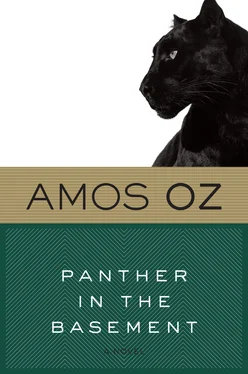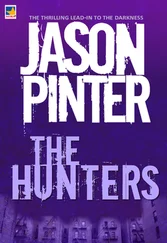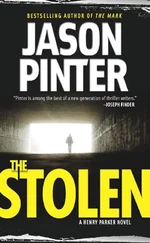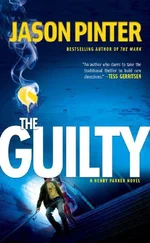"Ere the summer shall cease," he said, "I shall arise and return to the land of my birth, for the days of our unit in Jerusalem shall speedily come to an end."
I tried to conceal my excitement under a mask of politeness as I inquired:
"What is your unit?"
"Jerusalem Police. Northern Division. Section Nine. Speedily shall the British depart from the land. We are wearied. Our day is reaching its evening."
"But when?"
"According to the time of life, perhaps."
What a stroke of blessed luck, I thought, that it's me here and not Chita or Ben Hur, because they would never have known that "according to the time of life" means exactly one more year. And so they would have failed to discover a vital military secret. It was my duty to communicate it with lightning speed to the FOD and even to the real Underground. (But how? Through my father? Or Yardena?) My heart sang in my chest like a panther in a basement. Never before had I done such a wonderfully helpful thing and perhaps I never would again. And yet almost at the same instant I tasted in my mouth the sour, nauseous taste of low-down treachery: a shudder as from the sound of scraping chalk.
"And what will happen after the British evacuation, Sergeant Dunlop?"
"It's all written in the Good Book. 'For I will defend this city, to save it.' 'The adversary and the enemy shall not enter into the gates of this city.' 'There shall yet be old men and old women dwelling in the streets of Jerusalem, and the streets of the city shall be full of boys and girls playing.'"
How could I imagine that these meetings had already brought me under suspicion? That the Internal Security squad of the FOD High Command was watching my every move? I felt not a shadow of anxiety. I was convinced that Ben Hur and Chita were happy with my angling. Until one morning Chita, on Ben Hur's orders, painted on the wall of our house the words I mentioned at the beginning of my story, which I find it hard to repeat. And at lunchtime I found a note under the door: I was to appear in the Tel Arza Woods, to be interrogated, to stand trial for treachery. Instead of a panther in the basement, they saw me as a knife in the back.
At night, after lights-out, I used to lie in the dark listening. Outside, on the other side of the wall, was an empty, sinister world. Even our familiar garden, with the pomegranate tree and the village I had built out of matchboxes underneath it, was not ours at night: it belonged to the curfew and to evil. From garden to garden groups of fighters advanced in the darkness on desperate missions. British patrols armed with searchlights and tracker dogs roamed the empty streets. Spies, detectives, and traitors were pitted in a war of brains. Casting their nets. Planning cunning ambushes. The empty streets were lit by a ghostly light from streetlamps wreathed in summer mist. Beyond our street, beyond the confines of our neighborhood, lay more deserted streets, lanes, alleys, steps, arches, all pervaded by the darkness that was full of eyes, pierced by the barking of dogs. Even the row of buildings on the other side of our street seemed on those nights of curfew to be cut off from us by a river of deep darkness. As though the Dorzions, Mrs. Ostrowska, Dr. Gryphius, Ben Hur, and his sister Yardena were all on the other side of mountains of darkness. Beyond the same dark mountain were the Shibboleth newsstand and the Sinopsky Brothers grocery, protected by iron shutters and two padlocks. I felt that the phrase "beyond the same dark mountain" could be felt with your fingertips like thick black baize. Above our heads Mr. Lazarus's roof was swathed in darkness and the hens were pressed close together. On those nights all the hills that surrounded Jerusalem were mountains of darkness. And what was there beyond the hills? Stone-built villages, clustering around minarets. Empty valleys where foxes and jackals roamed and even the occasional hyena. Bloodthirsty gangs. And angry ghosts from bygone days.
I lay huddled, wide awake, until the silence became more heavily charged than it could bear, and then it began to be pierced by shots. Sometimes it was a distant stray burst of fire from the direction of Wadi Joz or Isawiya. At others a sharp, knifelike salvo maybe from Sheikh Jarrah or staccato machine-gun fire from Sanhedriya. Was it us? The real Underground? Brave boys signalling to each other from rooftop to rooftop with faint pocket flashlights? Sometimes after midnight a succession of heavy explosions came from south of the city, from the direction of the German Colony or, further still, from the Valley of Hinnom or Abu Tor or the Allenby Camp or the hills of Mar Ilias along the way to Bethlehem. A dim rumble rolled through the thickness of the ground under the asphalt of the roads and the foundations of the buildings making the windowpanes chatter and rising up from the floor into my bed, producing a cold shudder.
The only telephone in the vicinity was at the pharmacy. Sometimes late at night I seemed to hear repeated ringing from three streets away, pleading out there where there was not a living soul. And the closest radio was in Dr. Buster's flat, six buildings eastward. We would know nothing until dawn broke. Not even if the British tiptoed out of Jerusalem and left us alone, surrounded by masses of Arabs. Not even if hordes of armed marauders forced their way into the city. Not even if the Underground stormed Government House.
Through the other wall, from my parents' room, I could hear only silence. My mother might have been reading, in her dressing gown, or writing out a shopping list for the institution where she worked. My father would sit up till one, sometimes two o'clock, his back hunched, his head outlined by a halo of light from his desk lamp, intent on filling cards with information he needed for his book on the history of the Jews in Poland. Sometimes he would make a note in pencil in the margin of a book: The evidence is inconclusive, or, This could be interpreted differently, or even, Here the author is definitely mistaken. Sometimes he would incline his self-righteous, weary head and whisper to some tome on one of the shelves: "This summer too will pass. Winter will come. And it is not going to be easy." My mother would reply: "Please don't say that." Father: "Why don't I get you a glass of tea. Then you must get some sleep. You're so tired." There was a hesitancy in his voice, a midnight gentleness. In the hours of daylight he mostly spoke like a judge passing sentence.
One day a minor miracle occurred: one of Mr. Lazarus's hens laid some eggs and sat on them till five chirping chicks hatched out. Even though we had never seen a cock. My mother made some joking remark, but Father rebuked her:
"Stop it. The boy can hear."
Mr. Lazarus refused to sell the chicks. He gave each one a name. He spent the whole day pottering around on the sunbaked roof, with an expression of faint surprise, wearing a waistcoat, with a tape measure around his neck. He had hardly any work. Most of the time he argued in German with his hens, shouted at the chicks and forgave them, scattered seed, crooned lullabies, changed the sawdust, or stooped down and picked up a favorite chick, which he cradled against his breast and rocked like a baby.
Father said:
"If we have a little bread left over, or a cupful of soup—"
And my mother:
"I've sent him some already. The boy took it up, and some groats from yesterday too; we must go on saying it's for the chickens so as not to offend him. But what will happen in the long run?"
Father replied:
"We must do whatever we can, and hope."
My mother said:
"There you go, talking like the radio again. Stop it. The boy can hear."
Every evening the three of us sat in the kitchen, after supper and the start of the curfew, playing Monopoly. My mother would clasp a glass of tea in her hands, absorbing its warmth even though it was summer. And we would sort stamps and stick them in the album. Father liked to recount various facts about each country we came across. My mother soaked the stamps off the paper. After twenty minutes I fished the loosened stamps out of the basin of water and laid them out to dry on a sheet of blotting paper. The stamps lay there face downward like the photograph of Italian prisoners of war captured by Field Marshal Montgomery in the Western Desert: they sat in rows on the burning sand, with their hands tied behind their backs and their faces hidden between their knees.
Читать дальше












